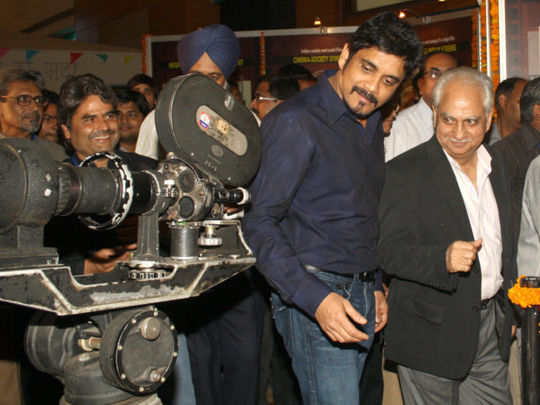
If it was Ramesh Sippy and Vishal Bhardwaj from Bollywood, there were Nagarjuna Akkineni and Rana Daggubati from down south. In a show of solidarity and unity, representatives from India’s multibillion dynamic cinema world came together for the inauguration of the Centenary Film Festival in New Delhi Thursday evening.
There was even veteran Oriya cinematographer-filmmaker Apurba Kishore Bir, who shared the stage with Information and Broadcasting Minister Manish Tewari, as well as Information and Broadcasting Secretary Uday Kumar Varma. Together, they lit the inaugural lamp for the six-day extravaganza.
Southern star Nagarjuna made a poignant point: “From the time I got into the film industry, I used to wish the line between north and south would vanish, and as we have approached the 100th milestone year, I see actors from south coming to north, and those from north coming to the south.
“It is the same with directors, who are increasingly picking from southern stories and vice versa. I think that is incredible,” said the 53-year-old, who looked as fit as the 28-year-old Daggubati.
Meanwhile, Tewari said the idea behind the festival on Indian cinema, the nation’s “soft power”, was to create and curate a week-long event, which “truly epitomises the ethos of the country”.
He spoke about how efforts for single-window clearance for foreign filmmakers as well as for levelling the “playing field” for Indian filmmakers are underway.
A highlight of the inaugural programme was the screening of the silent film Throw of Dice, with a live musical orchestra conducted by maestro Nishat Khan. The foyer display of old cameras with descriptions clearly gave one an idea of the progress the country’s cinema industry has made over a century since the silent film Raja Harishchandra was made in 1913.
Over the next few days,screenings of some classic as well as contemporary Indian films by master directors such as Bimal Roy, Guru Dutt, Shyam Benegal, Adoor Gopalakrishnan will take place. The fest is being celebrated at Siri Fort Auditorium as well as Jamia Milia University, Jawaharlal Nehru University and India Habitat Centre.
Another key highlight of the festival is the Cut-Uncut, a three-day workshop conceived and executed by members of the Central Board of Film Certification.
A Satyajit Ray retrospective and a display of his artwork has also been set up.
A play on the life and times of Dadasaheb Phalke by Aamir Raza Hussain will mark the end of the festival on April 30, while the centenary celebrations will culminate with the National Film Awards ceremony at Vigyan Bhavan on May 3.


